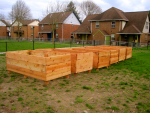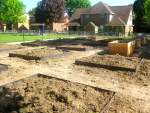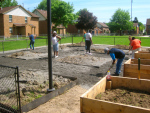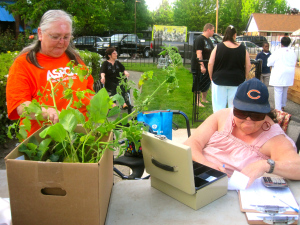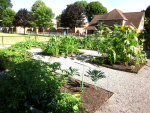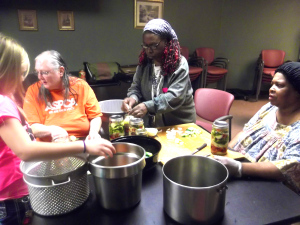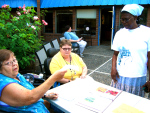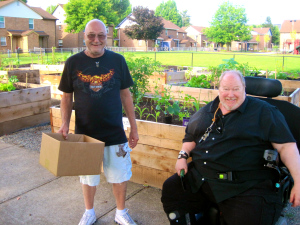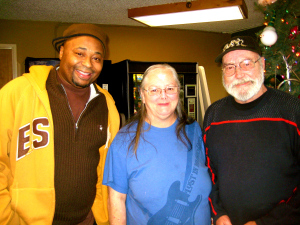Community Profile: Unthank Plaza / Eliot Square Community Garden
/In the beginning of 2012, residents of Unthank Plaza and Eliot Square expressed a desire to start a community garden. In March of 2012, Village Gardens partnered with these communities to help make their vision a reality. Formally, a brick wall physically divided the two communities, but in an effort to unify the housing properties, the wall was removed, creating a central space for the garden. This location enables open access for residents in both Unthank Plaza and Eliot Square. “One of the goals of the garden is to bridge the divide between the two communities,” says Jason, Community Programs Supervisor of Village Gardens who was key in initiating this project. At first glance, the two communities might seem quite different from each other: Unthank Plaza is designed for people over 62 years old and/or people with disabilities, while Eliot Square is composed of single-family dwellings. But the garden project opened up a new arena for dialogue, socializing, team work, and community building, which revealed to residents just how much they actually have in common.
It started with “building consensus and community,” Jason says. “The first step in our partnership with these communities was just to get to know each other and build trust with each other.” It was a process of making new connections between community members, residents, and volunteers of Village Gardens, Unthank Plaza, and Eliot Square. To start these dialogues, Village Gardens Community Leaders Barbara, Helen, and Trish led workshops at Unthank Plaza/Eliot Square. They started working together in March, and by May, what had once been an empty patch of grass had been transformed into a beautiful community garden.
The garden is composed of twenty-five cedar raised beds, built by the Oregon Trades Women, as well as in-ground plots. The landscaping was planned very intentionally, with five-foot wide pathways designed to accommodate mobility scooters and wheel chairs, and beds raised tall enough for easy access. The pathways were created with gravel and metal edging to control weed growth, but also for general walkability. “The garden was really designed so that everyone can be a part of it and work in it,” Jason explains, “no matter what your access of ability or mobility may be.”
To start the planting, Community Leaders Trish and Barbara held plant sales, and mentored Unthank Plaza/Eliot Square residents throughout the process to teach them how to hold plant sales themselves. There were three sales throughout the season, where residents could chose from a wide array of plants and vegetables to grow in their plots. These plant starts were grown and cared for by Village Gardens participants.Thegarden was created as a place open to all. With a commitment to donating eight hours of time a growing season to upkeep a plot and attend meetings, anyone in the community who wants a plot in the garden can have one for free.
Jack, Lissa, and Michael, three passionate gardeners and residents at Unthank Plaza, describe some of the successes, challenges, and highlights of the first season of the garden project. They continuously describe the process of building the garden as a “real community effort.” Jack says that everyone found a different way to contribute, regardless of ability: “Some could do physical labor, and those who couldn’t were baking and bringing out lemonade.” Lissa says she would bring coffee and ice water to everyone gardening. “It brought us together, to be more of a community,” explains Michael. “People are befriending one another a lot more because now they have interacted…it’s a good tool to actually befriend a new neighbor. It really changed the environment. You see a lot more people being friendlier with each other.”
They also explain how exciting it was to grow their own produce, watching the whole life cycle from seed to vegetable. Lissa says, “when I saw my first tomato, I was like, ‘I got a baby!’ It was so exciting!” Jack says he was “amazed” at the variety of plants they were able to grow: “We had zucchini, cucumbers, corn, watermelon, greens, tomatoes, eggplant, hot peppers, cantaloupe, green beans–it was a farmers market!” Jack took on a leadership role by planting two ground plots not for himself, but for the community. He planted one bed with cucumbers and the other with watermelons. Lissa also made a significant contribution by volunteering to water other people’s plots when they were not feeling up to it themselves. The garden produced more vegetables than they ever could have imagined. Jack says, “we had so much produce at one point, so we put boxes together for the fire department, because they do a lot for us.” “Next year we want to give to the fire department again,” Lissa adds, “keep that as a tradition.”
People had such an abundance of produce that they didn’t know what to do with it. To help folks learn a new, creative way to get the most out of their harvest, Village Gardens Community Leaders led a pickling and canning workshop that was very successful. Community Leader Trish also taught everyone how to make zucchini bread as part of the workshop. Jason says that “the purpose of these workshops is to empower people to ‘do it themselves’ by learning new skills and knowledge.” Lissa says the preserving workshop was one of the highlights of the season. “That canning, I was so proud of myself! I made it for my husband. He loved it. He wanted me to make more!” Jack says that he has “always been afraid of canning” because he thought “it was too complicated,” but he says “Jason made me realize its not, its actually pretty simple.”
Although the garden was very successful in many ways, the project still faced many challenges. Michael said that at times there would be arguing and bickering, but in the end it ultimately brought people together. “We can agree to disagree,” says Michael. “I learned that on a different level.” Jack and Lissa say that everyone learned a lot that will help them to be even more successful the following season. “I think this first season was a real learning experience for everyone. We made a lot of mistakes. But next year, we won’t make those same mistakes,” explains Jack. Michael says that the hard work in the garden “helped [them] to be a better community.” “Inside,” he says, “we have a TV, and people would argue over the channel. But outside [in the garden], everyone is working together.” In addition, Michael explains that they were inspired by each other to try new things: “I [grew] tomatoes and greens–I started with what I knew of. But then I saw people growing lemon cucumbers and watermelon– and now I want those, too! Now I’ve seen other people growing different things that I think would be cool to grow.”
Jack describes how the garden project helped improve the health of the community. “Gardening is a therapeutic activity. Its good to get out there in the sunshine, get exercise. And to actually see things growing. I started eating more vegetables. I wasn’t a big vegetable eater. I started eating fresh vegetables and I started feeling better. I even talked to my doctor about it.” Furthermore, the garden project has helped Unthank Plaza and Eliot Square better the health of the environment. “There was no compost here before the project,” Jack says. “Right now, I’m concentrating on composting. I’ve been saving all my kitchen scraps to add to the compost.”
With the help of Village Gardens Community Leaders, the residents of Unthank Plaza and Eliot Square have come together to create something truly amazing. The garden is a physical way to connect the two communities, and the opportunity to work towards shared goals inspires new friendships to form. Garden parties and workshops provide a space for folks to share skills, knowledge, and ideas aroundgardening, and encourage people to spend more time outside and start friendships with people they’ve never talked to before. Michael says, “the best is seeing the final outcome. Its like, if you stand looking in the womb, you aren’t going to like what you see. But at the end, its like WOW! Look at the end result! It’s really cool.” The garden was extremely productive and abundant–full of beautiful, colorful plants and vegetables. But Jack reminds us: “Not only are we growing vegetables, but we’re growing relationships.”
To get involved with the garden project at Unthank Plaza/Eliot Square, stay tuned at villagegardens.orgto learn about volunteer opportunities next spring.


